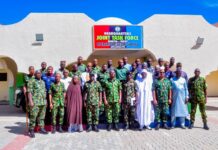By Prudence Arobani
#TrackNigeria: The International Organisation for Migration (IOM), says an upsurge in violent attacks in crisis-raven north-east Nigeria has displaced 59,200 people in the last three months.
The UN migration agency warned in Geneva that Northeast Nigeria displacement crisis had continued due to “increased sophistication’’ of attackers.
The agency noted the armed extremists, notably Boko Haram militants had contributed to a decade-long humanitarian crisis in Borno, Adamawa and Yobe, that had spilled over into the Lake Chad region.
“Since November, we have seen 59,200 displaced,” IOM Nigeria’s Chief of Mission, Frantz Celestin said, noting that in the last two years, “we have not seen that many people on the move”.
The last two months of 2018 were also marked by “an increased sophistication’’ of non-State armed groups accompanied by “an increased number of attacks and success in taking towns,” Celestin explained.
According to him, civilians continue to bear the brunt of conflicts that have led to widespread forced displacement and violations of international humanitarian and human rights law.
Since the start of the crisis, more than 27,000 people have been killed in the three north-eastern states, according to UN Office for the Coordination of Humanitarian Affairs (OCHA), while thousands of women and girls have been abducted.
“Government efforts to drive back the non-State armed groups that operate in the north-east of the vast country have been hindered by the Harmattan dust cloud, an annual phenomenon that sweeps across West Africa from approximately November to March.
“In the town of Rann, which was attacked in January, nobody was spare in one assault.
“The MSF (Médecins Sans Frontières) clinic was burnt, the IOM hub was attacked, the UNICEF clinic was attacked, the WHO/ICRC’s compounds were attacked,” Celestin said.
He said amid ongoing insecurity, humanitarian access was limited, hampering the ability of aid agencies to assess needs comprehensively.
Tens of thousands of civilians have fled into already overcrowded camps, mainly in Maiduguri, the capital of Borno, the IOM official added.
“One of our biggest issues in north-east Nigeria in addition to the security issues is the access to land.
“We have a number of camps that are overcrowded, in fact, if we were to take all of the camps together, we would have more than 249,000 people in camps that are completely congested, with Monguno (Borno) being the largest one of them.”
According to him, rumours of imminent attack are enough to convince communities to flee, as people have sought refuge in neighbouring countries of the Lake Chad region.
“There were a number of people who moved across a number of villages in Cameroon.
“Some of them were returned, they crossed the border and they were turned back. And for the recent (displacement), I don’t have the specific numbers. I have heard 30,000, but I have not been able to prove it.”
In 2018, 7.7 million people in Nigeria were in need of humanitarian assistance, and 1.7 million people were classified as “food insecure” between October and December, according to the UN humanitarian wing. (NAN)



